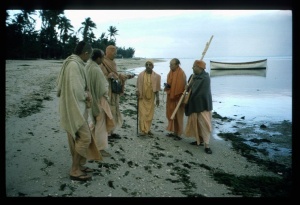SB 7.8.37-39: Difference between revisions
m (1 revision(s)) |
(Vanibot #0018 edit: make synonym terms in Sanskrit italic in SB - Vanisource) |
||
| Line 1: | Line 1: | ||
{{info | {{info | ||
|speaker= | |speaker=Nārada Muni | ||
|listener=King | |listener=King Yudhiṣṭhira | ||
}} | }} | ||
[[Category:Srimad-Bhagavatam - Canto 07 Chapter 08]] | |||
[[Category:Bhagavatam Verses Spoken by Narada Muni - Vanisource|070837]] | |||
<div style="float:left">'''[[Srimad-Bhagavatam]] - [[SB 7|Seventh Canto]] - [[SB 7.8: Lord Nrsimhadeva Slays the King of the Demons|Chapter 8: Lord Nṛsiḿhadeva Slays the King of the Demons]]'''</div> | |||
<div style="float:right">[[File:Go-previous.png|link=SB 7.8.36]] '''[[SB 7.8.36]] - [[SB 7.8.40]]''' [[File:Go-next.png|link=SB 7.8.40]]</div> | |||
{{RandomImage}} | |||
==== TEXTS 37-39 ==== | ==== TEXTS 37-39 ==== | ||
<div | <div class="verse"> | ||
tatropavrajya vibudhā | :tatropavrajya vibudhā | ||
brahmendra-giriśādayaḥ | :brahmendra-giriśādayaḥ | ||
ṛṣayaḥ pitaraḥ siddhā | :ṛṣayaḥ pitaraḥ siddhā | ||
vidyādhara-mahoragāḥ | :vidyādhara-mahoragāḥ | ||
manavaḥ prajānāṁ patayo | |||
gandharvāpsara-cāraṇāḥ | :manavaḥ prajānāṁ patayo | ||
yakṣāḥ kimpuruṣās tāta | :gandharvāpsara-cāraṇāḥ | ||
vetālāḥ saha-kinnarāḥ | :yakṣāḥ kimpuruṣās tāta | ||
te viṣṇu-pārṣadāḥ sarve | :vetālāḥ saha-kinnarāḥ | ||
sunanda-kumudādayaḥ | |||
mūrdhni baddhāñjali-puṭā | :te viṣṇu-pārṣadāḥ sarve | ||
āsīnaṁ tīvra-tejasam | :sunanda-kumudādayaḥ | ||
īḍire nara-śārdulaṁ | :mūrdhni baddhāñjali-puṭā | ||
nātidūracarāḥ pṛthak | :āsīnaṁ tīvra-tejasam | ||
:īḍire nara-śārdulaṁ | |||
:nātidūracarāḥ pṛthak | |||
</div> | </div> | ||
| Line 27: | Line 34: | ||
==== SYNONYMS ==== | ==== SYNONYMS ==== | ||
<div | <div class="synonyms"> | ||
''tatra''—there (in the sky); ''upavrajya''—coming (in their respective airplanes); ''vibudhāḥ''—all the different demigods; ''brahma-indra-giriśa-ādayaḥ''—headed by Lord Brahmā, King Indra and Lord Śiva; ''ṛṣayaḥ''—the great saintly sages; ''pitaraḥ''—the inhabitants of Pitṛloka; ''siddhāḥ''—the residents of Siddhaloka; ''vidyādhara''—the residents of Vidyādharaloka; ''mahā-uragāḥ''—the residents of the planets where great serpents reside; ''manavaḥ''—the Manus; ''prajānām''—of the living entities (on different planets); ''patayaḥ''—the chiefs; ''gandharva''—the residents of Gandharvaloka; ''apsara''—the residents of the angelic planet; ''cāraṇāḥ''—the residents of Cāraṇaloka; ''yakṣāḥ''—the Yakṣas; ''kimpuruṣāḥ''—the Kimpuruṣas; ''tāta''—O dear one; ''vetālāḥ''—the Vetālas; ''saha-kinnarāḥ''—along with the Kinnaras; ''te''—they; ''viṣṇu-pārṣadāḥ''—the personal associates of Lord Viṣṇu (in the Vaikuṇṭhalokas); ''sarve''—all; ''sunanda-kumuda-ādayaḥ''—headed by Sunanda and Kumuda; ''mūrdhni''—on their heads; ''baddha-añjali-puṭāḥ''—with folded hands; ''āsīnam''—who was sitting on the throne; ''tīvra-tejasam''—exposing His great spiritual effulgence; ''īḍire''—offered respectful worship; ''nara-śārdulam''—unto the Lord, who had appeared as half man and half lion; ''na ati-dūracarāḥ''—coming near; ''pṛthak''—individually. | |||
</div> | </div> | ||
| Line 34: | Line 41: | ||
==== TRANSLATION ==== | ==== TRANSLATION ==== | ||
<div | <div class="translation"> | ||
My dear King Yudhiṣṭhira, the demigods then approached the Lord. They were headed by Lord Brahmā, King Indra and Lord Śiva and included great saintly persons and the residents of Pitṛloka, Siddhaloka, Vidyādhara-loka and the planet of the snakes. The Manus approached, and so did the chiefs of various other planets. The angelic dancers approached, as did the Gandharvas, the Cāraṇas, the Yakṣas, the inhabitants of Kinnaraloka, the Vetālas, the inhabitants of Kimpuruṣa-loka, and the personal servants of Viṣṇu like Sunanda and Kumuda. All of them came near the Lord, who glowed with intense light. They individually offered their obeisances and prayers, their hands folded at their heads. | My dear King Yudhiṣṭhira, the demigods then approached the Lord. They were headed by Lord Brahmā, King Indra and Lord Śiva and included great saintly persons and the residents of Pitṛloka, Siddhaloka, Vidyādhara-loka and the planet of the snakes. The Manus approached, and so did the chiefs of various other planets. The angelic dancers approached, as did the Gandharvas, the Cāraṇas, the Yakṣas, the inhabitants of Kinnaraloka, the Vetālas, the inhabitants of Kimpuruṣa-loka, and the personal servants of Viṣṇu like Sunanda and Kumuda. All of them came near the Lord, who glowed with intense light. They individually offered their obeisances and prayers, their hands folded at their heads. | ||
</div> | </div> | ||
__NOTOC__ | |||
<div style="float:right; clear:both;">[[File:Go-previous.png|link=SB 7.8.36]] '''[[SB 7.8.36]] - [[SB 7.8.40]]''' [[File:Go-next.png|link=SB 7.8.40]]</div> | |||
__NOTOC__ | |||
__NOEDITSECTION__ | |||
Revision as of 05:11, 1 December 2017

A.C. Bhaktivedanta Swami Prabhupada
TEXTS 37-39
- tatropavrajya vibudhā
- brahmendra-giriśādayaḥ
- ṛṣayaḥ pitaraḥ siddhā
- vidyādhara-mahoragāḥ
- manavaḥ prajānāṁ patayo
- gandharvāpsara-cāraṇāḥ
- yakṣāḥ kimpuruṣās tāta
- vetālāḥ saha-kinnarāḥ
- te viṣṇu-pārṣadāḥ sarve
- sunanda-kumudādayaḥ
- mūrdhni baddhāñjali-puṭā
- āsīnaṁ tīvra-tejasam
- īḍire nara-śārdulaṁ
- nātidūracarāḥ pṛthak
SYNONYMS
tatra—there (in the sky); upavrajya—coming (in their respective airplanes); vibudhāḥ—all the different demigods; brahma-indra-giriśa-ādayaḥ—headed by Lord Brahmā, King Indra and Lord Śiva; ṛṣayaḥ—the great saintly sages; pitaraḥ—the inhabitants of Pitṛloka; siddhāḥ—the residents of Siddhaloka; vidyādhara—the residents of Vidyādharaloka; mahā-uragāḥ—the residents of the planets where great serpents reside; manavaḥ—the Manus; prajānām—of the living entities (on different planets); patayaḥ—the chiefs; gandharva—the residents of Gandharvaloka; apsara—the residents of the angelic planet; cāraṇāḥ—the residents of Cāraṇaloka; yakṣāḥ—the Yakṣas; kimpuruṣāḥ—the Kimpuruṣas; tāta—O dear one; vetālāḥ—the Vetālas; saha-kinnarāḥ—along with the Kinnaras; te—they; viṣṇu-pārṣadāḥ—the personal associates of Lord Viṣṇu (in the Vaikuṇṭhalokas); sarve—all; sunanda-kumuda-ādayaḥ—headed by Sunanda and Kumuda; mūrdhni—on their heads; baddha-añjali-puṭāḥ—with folded hands; āsīnam—who was sitting on the throne; tīvra-tejasam—exposing His great spiritual effulgence; īḍire—offered respectful worship; nara-śārdulam—unto the Lord, who had appeared as half man and half lion; na ati-dūracarāḥ—coming near; pṛthak—individually.
TRANSLATION
My dear King Yudhiṣṭhira, the demigods then approached the Lord. They were headed by Lord Brahmā, King Indra and Lord Śiva and included great saintly persons and the residents of Pitṛloka, Siddhaloka, Vidyādhara-loka and the planet of the snakes. The Manus approached, and so did the chiefs of various other planets. The angelic dancers approached, as did the Gandharvas, the Cāraṇas, the Yakṣas, the inhabitants of Kinnaraloka, the Vetālas, the inhabitants of Kimpuruṣa-loka, and the personal servants of Viṣṇu like Sunanda and Kumuda. All of them came near the Lord, who glowed with intense light. They individually offered their obeisances and prayers, their hands folded at their heads.